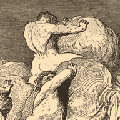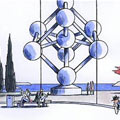Bij welke ikhoorernietbij-groep hoor jij?
Ik ben niet vlot, Ik ben niet slim/hoog-opgeleid, Ik kan mijn werk niet goed aan, Ik ben een nerd, Eenzaam aan de top, Ik ben niet aantrekkelijk, Mensen begrijpen me niet, Mijn mobiele telefoon gaat nooit, Ik heb een lichamelijke beperking, Ik heb geen geld, Ik heb geen werk, Ik heb het niet druk, Ik krijg geen contact, Ik heb het veel drukker dan anderen, Ik hoor bij een minderheidsgroep, Singles, Ik ben hoogbegaafd, Ik ben hoogsensitief, Ik heb geen hippe kleren, Ik juich niet om Oranje, Ik heb een afwijkende mening, Ik wíl helemaal nergens bijhoren
Maandelijks archief: februari 2007
ff deleten
Sinds D.W.Griffith en G.W. Bitzer rond 1915 de flashback introduceerden, zijn we met z’n allen geconditioneerd aan een universele filmtaal. Deze is net als elke andere taal collectief bezit en dus in voortdurende ontwikkeling. Vanaf de jaren negentig lijkt er aan de filmtaal, waarschijnlijk in wisselwerking met de opmars van de gekoppelde intelligentie van het World Wide Web, een nieuwe syntax met een interactief en non-lineair karakter te zijn toegevoegd. Pulp Fiction (1994) is daar nu al een klassiek voorbeeld van. Het is er allemaal niet eenvoudiger op geworden. Met films als Abre los ojos (1997), Donnie Darko (2001), Mullholland Drive (2001) en Adaption (2002) waarin heden en verleden, droom en werkelijkheid geraffineerd met elkaar vervlochten zijn, wordt het uiterste van ons gevraagd om de verhaallijn te volgen.
 Eternal Sunshine of the Spotless Mind uit 2004 is ook weer zo’n ingewikkelde film. De fantasie (je ex letterlijk uit je geheugen laten wissen door een stel nerds) is natuurlijk heel aardig. Doordat het geheugen van de hoofdpersoon selectief gewist wordt en we telkens teruggaan in het (gemanipuleerde!) verleden, ontstaat er net als in verhalen over tijdreizen, een ‘merkwaardige lus’: in werkelijkheid kan het niet, maar in de werkelijkheid die film heet kan het weer wel. Eternal Sunshine moet eigenlijk een paar keer gezien worden om het scenario tot zijn recht te laten komen. Ik kan me niet herinneren dat ik ooit in een film het thema boy meets girl zo verrassend belicht heb gezien. Maar misschien ben ik nu een stukje uit mijn geheugen kwijt…
Eternal Sunshine of the Spotless Mind uit 2004 is ook weer zo’n ingewikkelde film. De fantasie (je ex letterlijk uit je geheugen laten wissen door een stel nerds) is natuurlijk heel aardig. Doordat het geheugen van de hoofdpersoon selectief gewist wordt en we telkens teruggaan in het (gemanipuleerde!) verleden, ontstaat er net als in verhalen over tijdreizen, een ‘merkwaardige lus’: in werkelijkheid kan het niet, maar in de werkelijkheid die film heet kan het weer wel. Eternal Sunshine moet eigenlijk een paar keer gezien worden om het scenario tot zijn recht te laten komen. Ik kan me niet herinneren dat ik ooit in een film het thema boy meets girl zo verrassend belicht heb gezien. Maar misschien ben ik nu een stukje uit mijn geheugen kwijt…
Bron: Eternal Sunshine of the Spotless Mind [moviemeter.nl]
De titel is overigens een citaat uit een gedicht van Alexander Pope (1688 – 1744)
Fragment uit: Eloisa to Abelard
How happy is the blameless vestal’s lot!
The world forgetting, by the world forgot.
Eternal sunshine of the spotless mind!
Each pray’r accepted, and each wish resign’d;
Labour and rest, that equal periods keep;
“Obedient slumbers that can wake and weep;”
Desires compos’d, affections ever ev’n,
Tears that delight, and sighs that waft to Heav’n.
Grace shines around her with serenest beams,
And whisp’ring angels prompt her golden dreams.
For her th’ unfading rose of Eden blooms,
And wings of seraphs shed divine perfumes,
For her the Spouse prepares the bridal ring,
For her white virgins hymeneals sing,
To sounds of heav’nly harps she dies away,
And melts in visions of eternal day.
metanoia
(ook wel genoemd: Zondag van de Verdrijving uit het Paradijs)
Morgen begint de Grote Vasten

One may ask, however: Why should I perform this rite when I have no “enemies?” Why should I ask forgiveness from people who have done nothing to me, and whom I hardly know? To ask these questions is to misunderstand the Orthodox teaching concerning forgiveness. It is true that open enmity, personal hatred, real animosity may be absent from our life, though if we experience them, it may be easier for us to repent, for these feelings openly contradict Divine commandments. But the Church reveals to us that there are much subtler ways of offending Divine Love. These are indifference, selfishness, lack of interest in other people, of any real concern for them – in short, that wall which we usually erect around ourselves, thinking that by being “polite” and “friendly” we fulfill God’s commandments. The rite of forgiveness is so important precisely because it makes us realize – be it only for one minute – that our entire relationship to other men is wrong, makes us experience that encounter of one child of God with another, of one person created by God with another, makes us feel that mutual “recognition” which is so terribly lacking in our cold and dehumanized world.
On that unique evening, listening to the joyful Paschal hymns we are called to make a spiritual discovery: to taste of another mode of life and relationship with people, of life whose essence is love. We can discover that always and everywhere Christ, the Divine Love Himself, stands in the midst of us, transforming our mutual alienation into brotherhood. As I advance towards the other, as the other comes to me – we begin to realize that it is Christ who brings us together by His love for both of us.
And because we make this discovery – and because this discovery is that of the Kingdom of God itself: the Kingdom of Peace and Love, of reconciliation with God and, in Him, with all that exists – we hear the hymns of that Feast, which once a year “opens to us the doors of Paradise.” We know why we shall fast and pray, what we shall seek during the long Lenten pilgrimage.
Bron: ocafs.oca.org














